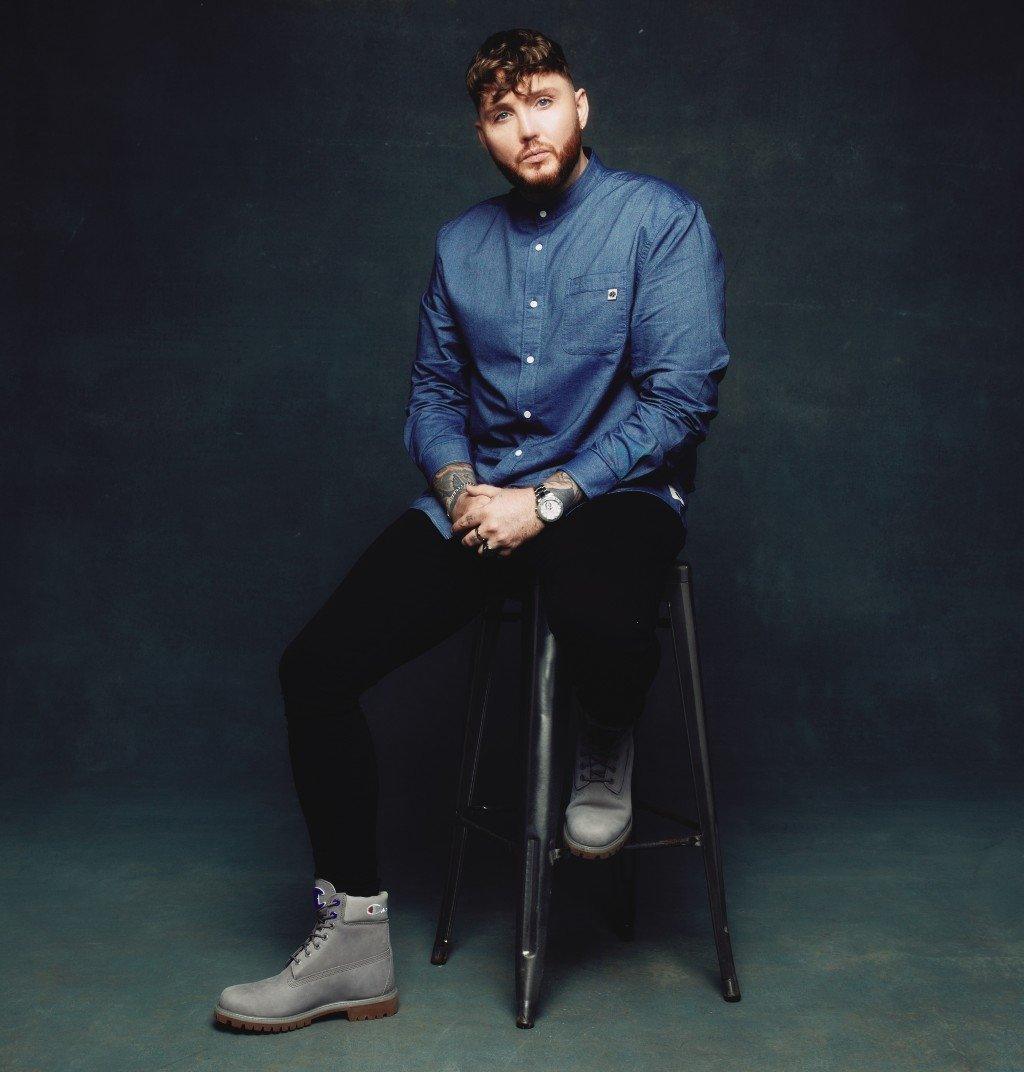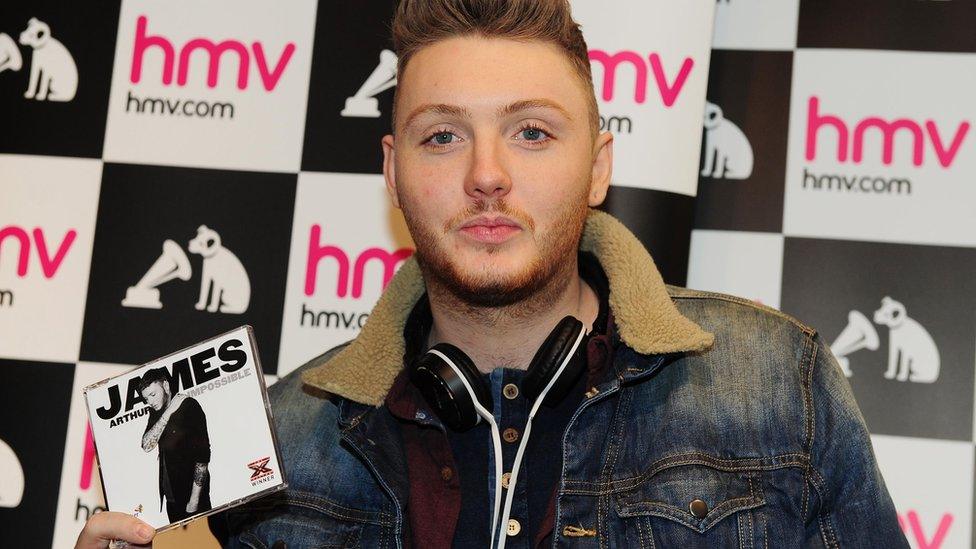James Arthur: 'I want to be one of the greats'
- Published

James Arthur's Say You Won't Let Go is one of the biggest-selling singles of the 2010s
Meeting your new partner's parents for the first time is a nerve-wracking experience for anyone.
While psychologists don't agree on a specific number, most suggest that you have less than 30 seconds to impress someone. One study even suggests you've got just 33 milliseconds, external before people start making judgements.
So spare a thought for poor James Arthur, who met his new girlfriend's mum under less than ideal circumstances.
The X Factor winner and multi-platinum singer-songwriter had driven her to her house, and was waiting outside when an idea took hold of him.
"I don't know what I was on at the time, but I drove to this little field near her house started making crop circles in the car. Like, doing donuts in the middle of this field," he cringes.
"I was a little bit away from the house, so I wasn't trying to draw attention to myself. I just thought she would find it funny.
"But then I got stuck in the mud."
And so Arthur's potential future in-laws pulled on their wellies and stomped into a marshy field to help. But as they pushed the car, he revved the engine and sprayed them full in the face with mud.
"I was just mortified," he says. "But she's a lovely Irish lady and she was cool about it.
"In a way it broke the ice. She found out pretty quickly that I was a silly goose."
The incident has now been immortalised on Arthur's latest single, September. "I remember being foolish when I met your mother," he sings, with conspicuous understatement.
Allow YouTube content?
This article contains content provided by Google YouTube. We ask for your permission before anything is loaded, as they may be using cookies and other technologies. You may want to read Google’s cookie policy, external and privacy policy, external before accepting. To view this content choose ‘accept and continue’.
Released as a single earlier this year, it's a romantic highlight of his new album, It'll All Make Sense In The End.
But the rest of the record treads on darker paths, charting the deterioration of Arthur's mental health during lockdown.
On the hazy opening track, Running Away, he admits, "I want to smoke 'til I can't wake up"; Avalanche is a snapshot of how mental health problems gather momentum until they bury you; while a staccato rap on Wolves dissects childhood trauma (Arthur lived through two divorces and ended up in foster care).
On the moving Medicine, he talks darkly of a "suicidal spiral".
Like many people, he says 2020 forced him to confront his demons.
'I hit a wall'
It all began with a gallbladder infection at the start of the year, which required tour-cancelling emergency surgery. The experience triggered severe anxiety, leaving him convinced he would "die on stage".
"It became clear that I needed therapy and, in particular, childhood trauma therapy."
The sessions were long overdue, he says.
"It's crazy that I've been in this business for the last 10 years and not addressed that stuff, especially with all the pressures and scrutiny that come with my job."
"I'd just been plodding on, not really addressing those things. Every so often, I'd hit a wall, then I'd recover and think everything was cool."
Back on his feet, he managed to complete a UK arena tour while maintaining his therapy regime.
"Then the pandemic struck and I just spiralled. I was re-evaluating everything, re-assessing everything. Like, do I even want to continue with music? I just wasn't happy. I wasn't happy in myself."

The singer says his new songs are designed to be played live
Part of the problem was that he'd set himself near-impossible goals.
After achieving the best-selling X Factor single of all time (Impossible, external, 1.4 million copies) and writing one of the biggest ballads of the 21st Century (Say You Won't Let Go, external, 1.9bn streams on Spotify) he still wanted more.
"I'm a really ambitious person and I wasn't achieving the goals I wanted to achieve," he says.
"Everyone was telling me, 'You're crazy, you can be so proud of everything you've done'. And I am, trust me, but I'm aiming for the stars. I want to be one of the greats.
"I don't just want to have one song that's done a couple of billion streams. I want to have 10. I want my music to reach as many people as possible."
With that in mind, his new album is something of a risk, eschewing the universal love songs of his first three records for a grittier, guitar-driven sound.
"I was in a particularly emo state of mind," he says, attributing the album's raw energy to the way it was recorded. "I made it all at home and every time I had an idea, I put it down, however I was feeling."
Allow YouTube content?
This article contains content provided by Google YouTube. We ask for your permission before anything is loaded, as they may be using cookies and other technologies. You may want to read Google’s cookie policy, external and privacy policy, external before accepting. To view this content choose ‘accept and continue’.
But while the album documents a period of immense pain, the over-arching theme is of hope and positivity and appreciation for the people who helped him survive.
"You're my bulletproof vest," he sings on Medicine. Later, on September, he adds: "You're the pin in my heart, it's a hand grenade".
"I've always just resonated with songs where the sentiment is 'you and me against the world'," says Arthur. "I think that's something that we can all relate to.
"I was focusing on the people around me because I was going through a dark time, and I put those feelings directly into the music.
"It's an album that genuinely helped me through a rough patch. So it means the world to me - because it was a lifesaver."

"X Factor was certainly the last resort for me," says the star, who auditioned at the age of 24
Fame has clearly taken a negative toll on the star's health over the years.
His first flush of success was quickly derailed by erratic behaviour, drug use and a homophobic outburst on a diss track. He subsequently described his actions as self-sabotage, prompted by deep-rooted feelings of unworthiness.
Although he rebuilt his career, it's tempting to class Arthur alongside fellow X Factor alumni like Rebecca Ferguson, Jedward and Cher Lloyd, who all made startling claims, external about being exploited by the show (and the music industry in general) earlier this year.
Arthur isn't aware of the specific allegations, but says he can sympathise.
"I will say one thing about going through a process like that: Quite often, [the contestants] come from working class backgrounds and have no experience of showbusiness or television - and it is quite a shock to the system.
"It certainly took me a few years to get over how sudden the success was. It definitely plays with your head and it's a really high pressure situation to be in. It's kind of sink or swim.
"But I can honestly say that the people that worked on the show did their best. I don't think that they could have done any more for me, personally. They had a welfare lady that was checking in on us all the time.
"But I think [the crunch time] is after the show when you're put back into society after going through something like that. And it all depends on who you've got around you."

Arthur says his X Factor single, a cover of Shontelle's Impossible, is now "excruciating to play live"
With X Factor now cancelled for good, Arthur is increasingly concerned with how working class musicians can get a break in the music industry.
He only auditioned for the show in 2012 when his mother bribed him by promising to pay his electricity bill for a month. Up until then, money had always been a barrier to his career.
"I had record label executives saying, 'You could be the next best thing since the Beatles' but it always came down to the fact that I didn't have any money that I couldn't progress.
"I've seen friends give up on music because they don't have the [financial] backing, they don't have management, they can't even afford a train ticket to London."
He notes: "It's great seeing someone like Sam Fender doing so well, because he's a proper northern lad like myself - but I think we've just got a bit of work to do to educate people outside of the South about different regions."
With that in mind, Arthur is leaving London after 10 years, and heading back to his hometown of Redcar, in North Yorkshire. He says his dream is to establish a record label there, championing local acts.
"The unemployment rate is the worst in the country but there's a lot of talent there," he says.
"You know, if you've got a trust fund and you can fund launching your music career that's all well and good [but] I'd just love to see people who didn't have the best start in life break through.
"Personally, I champion those people and root for them."

Follow us on Facebook, external, or on Twitter @BBCNewsEnts, external. If you have a story suggestion email entertainment.news@bbc.co.uk, external.
- Published28 April 2020

- Published8 December 2017

- Published16 March 2021
